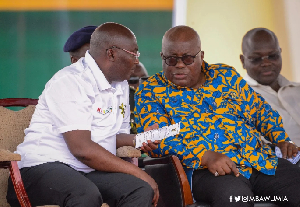Some executive producers have threatened that Ghanaians will wake up one morning to hear that radio stations all over the country have been banned from using music until they start paying royalties for using their property. This was disclosed by Mr. John Agbenu C.E.O of Precise Music Production in his office at Dansoman last Tuesday.
According to John this is the only way the music industry can regain its long lost credibility and efficiency. “The music industry is really going down because things have changed and now we have a lot of problems as compared to the past.
Now people are not buying music like they use to do and everything is gone down. People are enjoying free music on radio”, he stressed.
He recalls in those days it was only GBC Radio, (GBC 1 and GBC 2) when you release an album you don’t even have to border putting it on CD you only have to get it on cassette send it to GBC and after two weeks it becomes a national hit. Back then transmission began at 5:45am and close exactly 10:45pm in the evening.
After close of transmission anybody who wants to use music at that time in the night is forced to buy the CDs or tapes of the songs they want to hear.
But what do we see today radio stations don’t close at all and evening those who do is just for a few hours. For this Precise said people freely recording on radio and the stations themselves also use the music free of charge without paying the rightful owners.
Now most radio stations play music with no interruption from 11pm to the next morning because DJs who play around that time are all silent DJs.
After about 24 years in the industry he believes and thinks its time radio station recognized the importance of music and no that know that no radio station can ever survive without playing so the music has to be paid for.
On the part of DJs or presenters he said; most of them are very lazy, when they come on air all they do is announce the time and date”.
“They don’t even border to mention the name the artistes rather they keep playing their own jingle and repeating their name to make themselves popular”. He added that professionally they are not supposed to play a song in full but today they play full version of songs and even play full albums.
Mr. Agbenu also stated that the stations as a body also do countless promotions including free petrol, free transportation and most currently paying electricity bill, water bill and even pay school fees of their listeners and they refuse to pay royalties to musicians who are the pillars of the station.
Furthermore he explained that music production has become a risky business because before an album is released the executive producer has already invested over ¢200million for studio work, inlay printing, CD and tape duplication, promotion on TV and radio (including payola) and there is no assurance of getting this money back not…to think of making profit.
John said he and his fellow executive producers are not going to rest until there is change.
Another producer / executive producer Mark Okraku Mantey agrees that yes in a way radio is part of the down fall of the industry. He blamed it on frequent test transmission by new stations.
For instance this year in Accra alone there have been about four new radio stations that did test transmission for months without talking. Mark also said the trend of mixing on radio is a contributing factor.
He went on to say that all the DJs have a particular rhythm they can easily do their mixing which means when your song does not sound like that you are not part of radio air play. “This is the reason why every song sounds the same on radio these days”.
Though, Mark believes radio has its positive side, he still supports that radio stations are not helping executive producers and musicians professionally like they should. “A DJ plays over one hour continue music without giving any information on a single artiste. That is wrong”
















